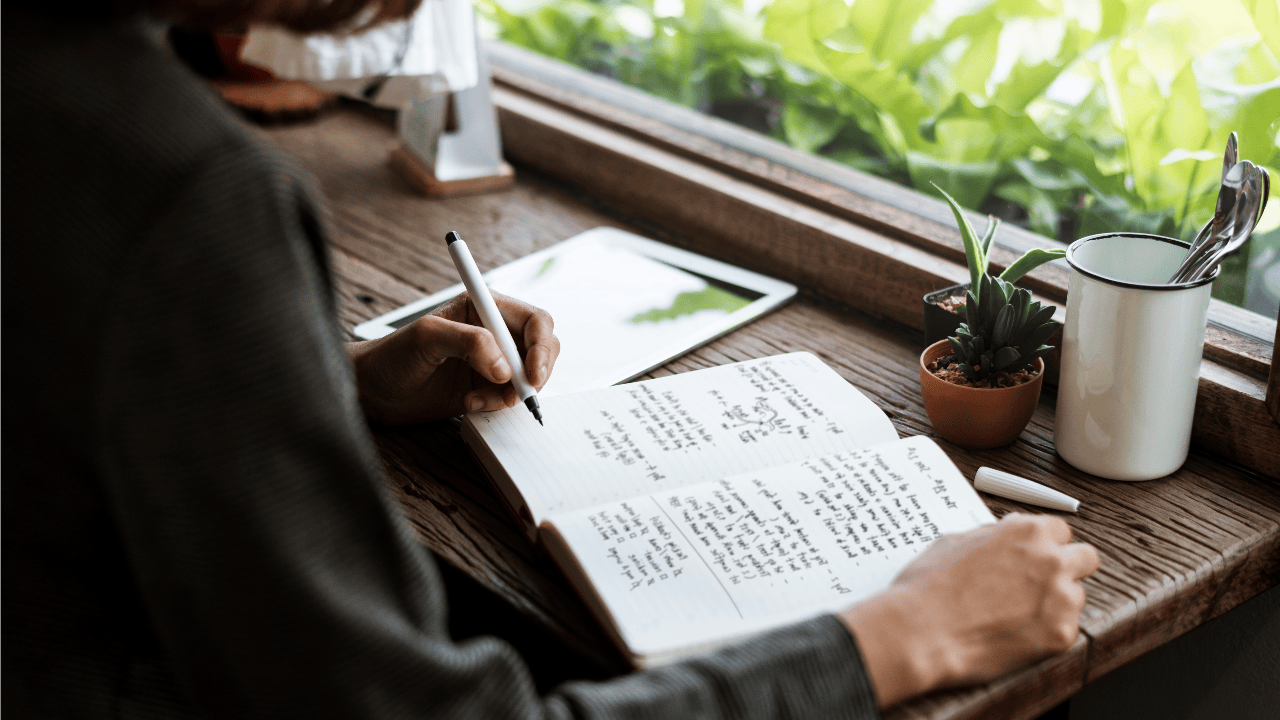How to Start Journaling: 8 Effective Tips For Beginners
By Julian Lewis • December 8, 2023

Introduction: Embracing the Journey of Journaling
Journaling, a simple yet profound practice, offers a world of benefits waiting to be discovered. Whether you are about to start journaling or are seeking ways to enrich your current routine, understanding the essentials of this art form is key. Journaling goes beyond just putting pen to paper; it's a journey of self-exploration, emotional release, and a catalyst for creativity. In this guide, we delve into practical journaling tips and the multifaceted benefits that come with this practice. From fostering a deeper understanding of oneself to enhancing writing skills, journaling can transform mundane moments into meaningful reflections. So, let's embark on this journey together, turning the pages of your journal into a canvas where thoughts, dreams, and growth intertwine.
Join our Newsletter
Transform your career with our personal growth insights. Get one valuable tip right in your inbox every Saturday morning.
Benefits of Journaling
Journaling, an often undervalued tool, can be a life-changing practice with profound impacts on various aspects of our daily life. Here, we explore two key benefits that highlight the transformative power of journaling.
Helps You Work Through Challenges
Journaling is a powerful ally in navigating life's challenges. It provides a safe, private space to express thoughts and emotions, allowing for a deeper understanding of personal experiences. This reflective practice fosters self-awareness, enabling individuals to recognize patterns in their thoughts and behaviors. By writing down worries and fears, one can disentangle complex emotions, leading to clearer thinking and problem-solving. Moreover, journaling can be a therapeutic process, contributing significantly to mental health. It encourages a healthy outlet for emotional release, reducing stress and anxiety. The act of writing also helps in processing traumatic events, offering a path to healing and emotional resilience.
Helps You Set and Accomplish Goals
Beyond emotional wellness, journaling is an effective tool for goal setting and achievement. It allows for the articulation of aspirations and dreams, transforming vague ideas into clear, actionable objectives. By regularly documenting progress, setbacks, and insights, journaling keeps you accountable and motivated. It serves as a visual reminder of your journey, highlighting growth and learning opportunities. This systematic approach to goal setting through journaling fosters discipline and focus, making it easier to navigate the path to success. Whether personal or professional, the goals documented in your journal become more tangible and attainable, thus making journaling an invaluable practice for anyone looking to enrich their life and achieve their ambitions.

How to Start Journaling & Create a Journaling Habit
Beginning a journaling practice can be a transformative step in your personal development journey. Here's how to start journaling and establish it as a regular habit.
How to Start Journaling: Simple Daily Journal Prompts to Get You Started
The first step to start journaling is to break through the initial hesitation. Begin with simple prompts that guide your thoughts and make the process less daunting. Start with prompts like, "What am I grateful for today?" or "What did I learn about myself this week?" These prompts can help initiate a flow of thoughts, making it easier to engage with your journal. You can also use prompts to reflect on your day, dream about the future, or ponder life's big questions. The key is to find prompts that resonate with you and ignite your desire to write.
Create a Writing Routine
Consistency is crucial in forming any habit, and journaling is no exception. Designate a specific time each day for your journaling practice. It could be in the quiet of the early morning, during a lunch break, or as a way to wind down before bed. Choose a time when you are least likely to be interrupted and can give your full attention to your thoughts. Creating a comfortable and inviting space for journaling can also enhance your routine. Whether it’s a cozy corner in your home or a park bench, find a spot that feels right for you.
Journal Regularly
The benefits of journaling are most evident when it’s done regularly. Commit to writing in your journal daily, even if it’s just for a few minutes. Don’t worry about grammar or making your entries perfect. The goal is to make journaling a natural and regular part of your day. Over time, you will find that your journal becomes a trusted companion, a place to explore your thoughts, emotions, and experiences in a safe and nurturing space.
By starting with simple prompts, establishing a writing routine, and committing to regularity, you’ll soon find journaling to be an integral, rewarding part of your daily life.
Letting Go of Conventional Journaling Myths
Journaling is a personal and flexible practice, yet it's often shrouded in myths that can deter potential journalers. Let's debunk some common misconceptions to help you embrace journaling in a way that suits you best.
You Don't Have to Keep a Paper Journal
One prevalent myth is that true journaling can only be done in a traditional paper journal. This isn't the case. In our digital age, there are numerous alternatives. Digital journals, apps, or even simple word processing documents can be just as effective. These digital options offer convenience, portability, and features like password protection for privacy. Whether you prefer the tactile experience of writing on paper or the convenience of a digital format, the key is finding what works best for you.
You Don't Have to Write First Thing in the Morning
Another common belief is that journaling should be done first thing in the morning, often referred to as 'morning pages.' While this works for some, it's not a one-size-fits-all rule. Journaling can be just as effective at any time of the day. The best time to journal is when it fits naturally into your schedule and when you feel most inclined to write. Whether it's in the morning, during a lunch break, or before bed, what matters most is consistency and finding a rhythm that aligns with your lifestyle.
Let Go of Judgments (Write for Your Eyes Only)
Finally, let go of the notion that there’s a right or wrong way to journal. Your journal is a private space for honest self-expression. Write for yourself, not for an audience. This freedom from judgment allows you to explore your thoughts and feelings more openly and honestly. Remember, the purpose of journaling is personal growth and self-reflection, not creating perfect prose.
By letting go of these conventional myths, you open up a world of possibilities in your journaling practice. Embrace the flexibility and personalization that journaling offers and find the method that best suits your unique needs and preferences.

Finding Your Unique Journaling Style
Journaling is not a one-size-fits-all activity; it’s a personal endeavor where your unique style and preferences come to the fore. Understanding different journaling techniques can help you find a method that resonates with you, enhancing your experience and the benefits you reap from this practice.
5 Types of Journaling
- Traditional Diary: This is the classic form of journaling, where you chronicle your daily experiences, thoughts, and feelings.
- Bullet Journaling: This method involves organizing your journal into bullet points, combining to-do lists, planners, and diaries. It's excellent for those who enjoy structure and organization.
- Gratitude Journaling: Focusing on things you're grateful for, this type of journaling can increase positivity and improve mental health.
- Goal-Oriented Journaling: This technique revolves around setting, tracking, and reflecting on personal or professional goals.
- Dream Journaling: Here, you record and interpret your dreams, which can be a fascinating way to understand your subconscious mind.
Stream of Consciousness/Free Writing Journaling
Stream of consciousness or free writing is a liberating form of journaling. Here, you write continuously without worrying about grammar, structure, or even coherence. It’s about letting your thoughts flow freely onto the page. This technique is particularly useful for unearthing deep-seated emotions and thoughts, leading to significant insights and self-discovery.
Adding Creative Elements
Creative journaling involves blending traditional journaling with artistic elements. This can include drawing, doodling, using stickers, or incorporating photos. Such an approach can make journaling a more engaging and enjoyable process, especially for those who express themselves better visually or tactilely. It’s also a fantastic way to enhance memory retention and make your journal a more vivid chronicle of your life.
Each journaling style offers unique benefits and ways of expressing oneself. Experiment with different methods to find what suits you best. Whether it’s the structured approach of bullet journaling or the unbridled freedom of stream of consciousness writing, your journaling practice should be a reflection of your personality and needs.
The Practicalities of Journaling
Embracing the habit of journaling also involves paying attention to its practical aspects. Ensuring you have the right tools and environment can significantly enhance your journaling experience.
Have the Tools You Need
The first step is to choose your journaling medium. A beautiful notebook can be a great motivator if you prefer writing by hand. The tactile feel of paper and the act of writing can be therapeutic in itself. For those who lean towards digital convenience, a notes app on your smartphone or tablet can be a perfect choice. It offers accessibility and features like searchability and cloud backup. Selecting a comfortable and fluid-writing pen can also make the physical act of writing more enjoyable. The key is to choose tools that make the process inviting and pleasurable for you.
Keep a Journal Handy in Your Bag
Carrying your journal or digital device with you ensures that you can jot down thoughts, ideas, or experiences whenever inspiration strikes. This practice also helps in integrating journaling into your daily routine, making it a natural part of your day.
Make It Feel Special and Enjoyable
Personalize your journaling experience to make it feel special. This could mean setting up a cozy journaling corner, using your favorite pen, or even lighting a candle to create a serene atmosphere. The goal is to make journaling an activity you look forward to. By associating it with positive and enjoyable experiences, you're more likely to stick with the habit and fully embrace the benefits it offers.
Incorporating these practicalities into your journaling routine not only simplifies the process but also makes it more enjoyable and meaningful. Remember, the more you enjoy journaling, the more likely you are to make it a lasting part of your life.
Join our Newsletter
Transform your career with our personal growth insights. Get one valuable tip right in your inbox every Saturday morning.
Overcoming Journaling Challenges
Even the most dedicated journalers can face hurdles. Whether it's writer's block or simply not knowing what to write about, there are strategies to overcome these challenges and keep your journaling practice alive and fruitful.
If You've Got Writer's Block, Write About Gratitude
Writer's block is a common challenge in journaling, often manifesting as a daunting blank page. One effective way to overcome this is to shift your focus to gratitude. Start by writing about things you're grateful for. It could be as simple as a warm cup of coffee, a kind gesture from a friend, or a beautiful sunset you witnessed. Gratitude journaling shifts your perspective, sparks positivity, and can effortlessly flow into other areas of writing. It's a simple yet powerful tool to unblock your thoughts and keep the ink flowing.
Keep a List of Journaling Prompts for Speechless Days
For days when words just don't come easily, having a go-to list of journaling prompts can be a lifesaver. This list can include a variety of prompts, from reflective questions like "What are my top three goals right now?" to more imaginative ones like "If I could travel anywhere, where would I go and why?". These prompts act as a starting point, giving direction to your thoughts and helping you engage with your journal. Keeping this list within your journal or as a note on your digital device ensures that you're always prepared, turning those speechless days into opportunities for insightful journal entries.
By adopting these strategies, you can navigate through the common challenges of journaling. Remember, the key is to keep writing, no matter how small or seemingly insignificant your entry may seem. Each word you write is a step forward in your journaling journey.

Building Your Journaling Routine
Creating a journaling routine is about establishing a habit that integrates seamlessly into your daily life. A well-crafted routine can transform journaling from a sporadic activity to a cornerstone of your daily self-care and reflection.
How Do You Create a Journal Writing Ritual?
A journal writing ritual is more than just writing; it’s about creating a set of practices that signal to your mind it’s time to reflect and write. Start by choosing a comfortable and quiet space where you can be undisturbed. You might want to incorporate a cup of morning coffee or soft background music to make the experience more enjoyable. The idea is to create an atmosphere that you look forward to, making journaling a pleasant and calming part of your day. This ritualistic approach helps in mentally preparing you for writing and sets the right tone for your journaling session.
Journal at Approximately the Same Time Each Day
Consistency is key in building any habit, and journaling is no different. Try to journal at the same time each day, whether it’s first thing in the morning, during a lunch break, or before bed. This consistency helps solidify the habit. The regularity not only makes it easier to remember to journal but also ingrains it as a part of your daily rhythm.
How to Journal Consistently – Creating the Journaling Habit
To journal consistently, start by setting a realistic goal. It could be as simple as writing for five minutes a day or jotting down three things you’re grateful for. Use reminders or alarms if needed to keep you on track. Also, be flexible and forgiving with yourself. If you miss a day, don’t give up—just pick up where you left off. Over time, as you stick to your routine, journaling will become a natural and indispensable part of your daily life, much like your morning coffee.
Incorporating these strategies into your daily routine can transform journaling into a habit that not only nurtures your mental well-being but also becomes a highlight of your day.

Tips for Effective Journaling
Effective journaling doesn’t have to be complex or time-consuming. By starting with small steps and keeping your approach simple, you can make journaling a rewarding and sustainable part of your life. Here are some tips to help you journal effectively.
Start Small and Keep Your Expectations Realistic
One of the key aspects of building a successful journaling habit is to start small. You don’t need to write pages every day; even a few sentences can be incredibly beneficial. Set realistic goals for your journaling practice. For instance, begin with writing a few lines about your day or jotting down one thing you’re grateful for. Keeping your expectations realistic helps in avoiding feelings of overwhelm or failure, making it more likely that you’ll stick with your journaling routine.
Use Journal Prompts
When you’re unsure what to write about, journal prompts can be a great tool. They provide a starting point and can help spark ideas and reflections. Prompts can range from simple questions like “What made me smile today?” to more introspective ones like “What challenges am I currently facing and how can I overcome them?”. Using prompts not only gives direction to your writing but also helps in exploring different aspects of your life and thoughts.
Just Write!
The most important tip for effective journaling is to just write. Don’t worry about grammar, spelling, or making your journal entries perfect. Remember, your journal is a private space for self-expression and exploration. Let your thoughts flow freely without judgment. The act of writing itself is therapeutic and beneficial, regardless of the content. Over time, you’ll find that simply writing in your journal becomes easier and more natural.
By starting small, using prompts, and embracing the simplicity of just writing, you can develop a journaling practice that is both effective and enjoyable. Remember, the value of journaling lies in the process, not just the outcome.
Developing a Personal and Meaningful Practice
Creating a journaling practice that is both personal and meaningful involves experimentation, self-discovery, and a commitment to your own growth. Here are some tips to help you develop a journaling habit that resonates deeply with you and enriches your life.
How to Start a Personal, Meaningful Journaling Practice
To begin a personal and meaningful journaling practice, start by reflecting on what you hope to achieve through journaling. Are you looking for self-discovery, stress relief, creative expression, or a way to track your personal growth? Your goals will guide your journaling process. Initially, give yourself the freedom to explore various styles and formats. You might try writing letters to yourself, listing things you're grateful for, or simply reflecting on your day. As you experiment, pay attention to what feels most fulfilling and enlightening. This will help you create a practice that is uniquely yours.
Find the Journaling Techniques That Work for You
The beauty of journaling lies in its flexibility and the vast array of techniques available. You may find that a structured approach, like bullet journaling or goal-oriented writing, keeps you focused and motivated. Alternatively, free writing or artistic journaling might offer the freedom and creativity you crave. Pay attention to how different techniques make you feel. Do they bring clarity, joy, relief, or insight? Your emotional and mental responses are key indicators of what works best for you.
Remember, your journaling practice is a personal journey. It’s about finding what resonates with you, and there’s no 'right' way to journal. Whether it’s through structured entries or free-flowing prose, what matters most is that your journaling practice becomes a cherished and meaningful part of your journey towards personal growth.
Conclusion: Your Journaling Journey
As we reflect on the journey of journaling, it's clear that this practice is much more than just writing in a journal. It's a path to self-awareness, a tool for personal growth, and a source of daily joy and discovery. You've explored various aspects of journaling, from overcoming challenges to finding your unique style and building a consistent routine.
Remember, your journaling journey is uniquely yours. It evolves with you, offering a safe space for reflection and creativity. As you continue this practice, embrace the changes and growth it brings. Let your journal be a witness to your life’s journey, a companion in your moments of introspection, and a canvas for your evolving story. Keep enjoying the process of writing, and let your journal be a source of comfort and insight in your life.
May your journaling journey be fulfilling, enlightening, and deeply rewarding as you continue to explore the depths of your thoughts and experiences.
Read more about: Well-being
About Julian Lewis
Julian Lewis is a driven and accomplished professional with a passion for driving positive change in the business world. He is the co-founder and COO at Zella Life.
His own experience as a professional of color in a Fortune 500 company led him to discover the limitations for advancement that many professionals like himself face. Determined to reach his full potential, Julian became an established business coach and entrepreneur, committed to supporting others in their pursuit of personal and professional growth.
Today, Julian is a recognized corporate trainer, coach, and leader, known for his ability to leverage real-life experiences and evidence-based methodologies to affect positive change within individuals and organizations. As the leader of Zella Life's coaching division, he is dedicated to empowering individuals and businesses to achieve their full potential.